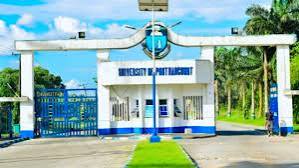By Mandy Tina
The University of Port Harcourt Teaching Hospital (UPTH) has announced plans to commence kidney transplantation by October 2024, “upon completion of ongoing preparations.”
This was disclosed by Professor Datonye Alasia, Chairman of the Medical Advisory Committee (CMAC) at UPTH, during a Ground Rounds presentation by the hospital’s Renal Department.
Professor Alasia said that the establishment of the kidney transplantation center is a crucial component of the hospital’s strategic plan which is aimed at expanding the hospital’s scope of services.
According to him the transplantation center is achieving success through collaboration with organisations, such as the Nigeria Liquified Natural Gas, NLNG, and other organisations, to equip the centre for the services.
“NLNG has a foundation where they support healthcare and they have been doing this across the country. So for us, there is an MoU to equip a dialysis center but we felt that would be limited in scope so we had to find a way to push it up to align with our plans for a transplantation centre, so that collaboration is there and we are happy to say that NLNG has done something significant.
“They have funded the provision of equipments and some supports to the external works and we are actually at eighty five percent (85%) of completion and that is going to contribute to the success of the project.
“For us, our strategic timeline is October, 2024, and that is what we are working towards but of course if all the assumptions go as we plan, it will be October because we have trainings of staff, people will travel, MoUs will be signed, procurement timelines will also affect us but our focus is to stay on that date and see that we achieve it.
“For today, we have the Renal Department presenting because of the planned renal transplantation and the essence is to create the awareness internally and from the programme you see that it involves different professional groups such as nephrology, pharmacist, paediatricians, nurses, psychologist and virtually everybody in the hospital. So it is a multi-disciplinary thing.
“This presentation also helps members of the team to have a better understanding of what they are expected to offer transplant patients and every aspect of the service that will influence the patients journey.We also believe that this would improve that multi-disciplinary team spirit”.
He further noted that the hospital have kick-start a transplant clinic to demonstrate it readiness for the transplantation programme.
“We have kicked off the transplant clinic. While it was there, it was not structured specifically to attend to patients before transplant and post transplant but now there is a deliberate attempt to structure it to make the public know clearly that the transplant clinic is a dedicated service.
“We used to run within the nephrology clinic before and the urology clinic but it’s now a clinic of its own so that’s the first step. So the public should know that that service is being offered here.
“And of course collaboration and partnership with people such as foundations who have interest to support transplantation and they may now find that since they are aware, they can now interface and network with us to see how they can support because kidney transplantation is a very cost intensive venture”.
The UPTH Transplant Team Lead and Consultant Urologist, Professor Onyeanunam Ekeke, assured the public that with proper screening, kidney disease can be treated and transplanted, noting that the hospital has qualified personnel’s.
“The kidney is one of the organs that are called vital organs it means without a functioning kidney no one can live. The kidney could be damaged, have a disease or malfunction from birth, and when the kidney have disease’s they are treated in one or several ways.
“But it can get to the extent the kidney is completely lost, removed or it would not be able to carry out it function. Temporary measures may be used such as dialysis, when the kidney is not functioning the waste product urine, faeces can not be removed it stay in the blood and affect a person negatively.
“To restore the function there may be need to bring a new kidney that is the transplantation. UPTH has a large team, UPTH is set up as an institution for training, service and for research but we are highlighting the area of service, so we have a lot of skilled personnel and we have the patients that also requires transplant.
“We have not started before now but we are in the process of starting the transplant programme. The present management of the hospital as part of the five years development programme wants to carryout this kidney transplant.
“I urged members of the people to know that when kidney fails they can be replaced,the process of transplantation is safe”.
 PH Mundial – Port Harcourt Online Newspaper News Across The Region
PH Mundial – Port Harcourt Online Newspaper News Across The Region





